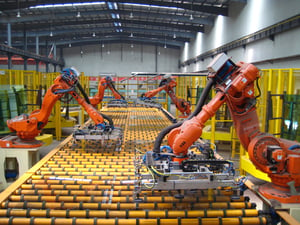
It was 1961. John F. Kennedy was just sworn into office, gas cost 27 cents per gallon, and the Unimate 1900 series became the first mass-produced robotic arm for factory automation.
Industrial robots have come a long way since George Devol and Joseph Engelberger first surfaced the idea in 1956. Today, over 1.8 million operational industrial robots exist worldwide, and experts anticipate this number to reach 3 million by 2020.
So, why are more and more businesses integrating automated machines into manufacturing processes? Below we make the case, with four reasons to consider using industrial robots in your warehouse operation.
1. Safety
Safety is a key motivator for automation. In the case of the Unimate, General Motors saw the safety benefits of industrial robots and used them to weld die casted parts on auto bodies (a dangerous task for workers who could lose limbs or be poisoned by gas from the exhaust).
Today, manufacturers use industrial robots to prevent common workplace injuries like slips, trips, falls and overexertion. For example, Arla Foods realized they had a problem when their employees kept getting injured from repeatedly moving blocks of cheese from one conveyor belt to another. The Swedish dairy producer installed industrial robots to automate the strenuous packaging process and trained their workers to monitor the system.
Consider industrial robots to automate hazardous tasks, like drilling or welding, and improve workplace safety in your warehouse.
2. Production
When it comes to production, manufacturers turn to industrial robots for faster assembly. Machines use advanced sensing technologies to locate parts and fit them with other components.
Take the snack manufacturer, Old Dutch Foods, as an example. The company implemented a warehouse automation technology that utilized an advanced conveyor system, taking product directly from manufacturing to the delivery trailers. This streamlined distribution and helped Old Dutch double production.
Automating assembly line tasks also enables employees to focus on more important work like final product inspection.
3. Quality
Industrial robots improve production, and they improve the quality of the final product.
When people get tired, they tend to make mistakes. But unlike humans, robots don’t need rest. Industrial robots eliminate problems associated with distractions and tiredness that can affect product quality. They are programmed to repeat precise functions like cutting or sanding, and ensure the final result consistently meets quality expectations.
Boeing is a great example of a company that’s long used robots to automate the repetitive process of painting aircraft, as well as inserting rivets used to join sections of planes. With automation, Boeing is able to speed up tedious tasks, while still maintaining high-quality production.
4. Cost Savings
Although industrial robots have a high up-front cost, the long-term return on investment (ROI) outweighs the initial price. For instance, one online women’s apparel retailer used 30 autonomous robots from Locus Robotics to help with picking and sorting products for delivery. The result? Productivity doubled and the time needed to train employees was cut in half.
Automated systems optimize processes, cut labor costs and increase output. They produce higher quality products that can increase profit margins for manufacturers.
Get Started Lowering Costs with Automation
Want to lower your manufacturing costs? Want to out-perform your competition? You need automation.
Manufacturers across the globe are embracing the technology. Avoiding it limits your competitive edge—and we understand that.
Whether you need consultation on new product development or full metal fabrication for your automated system, our expert engineering and production staff will work with you to develop a solution that delivers results. Contact Hynes to schedule a free design consultation for your project.

